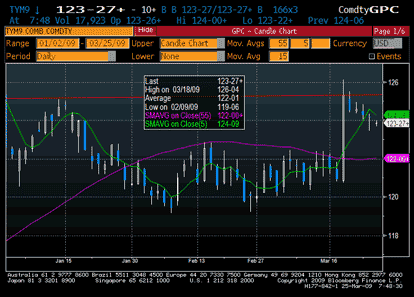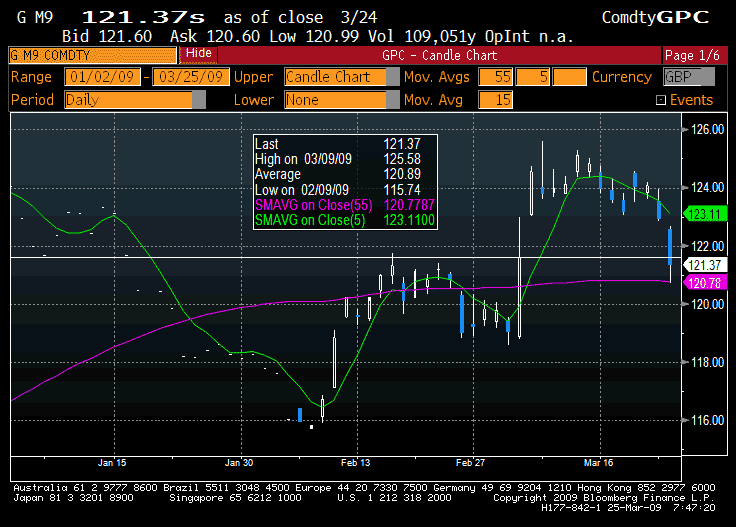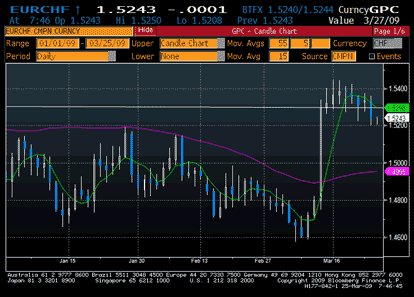Was it only a week ago that Macro Man was writing about the “shock and awe” of the Fed’s dramatic embarkation into the world of QE and credit easing? The world seemed alive with possibilities, with the triple barrels of the Fed, the BOE, and the SNB aimed at stemming the impact of collapsing global monetary velocity.
A week on, and “shock and awe” is looking more like “shock and awful.” Ten year note futures are nearly a full point below the first price printed after the FOMC announcement, and a point and a half below the closing level on the day. If you bought and held bonds on the Fed’s announcement, you have lost money. Put another way, the only way to make money out of the Fed’s QE was to be on the distribution list-and make no mistake, it exists in the banana republic market that the US has become-and get the tip-off in advance. As an additional kick in the teeth, the Fed, after having initially announced that the vast majority of UST purchases would be in the 2-10 year sector, announced last night that it would buy back some long bonds as well. While the two statements weren’t technically contradictory, in hindsight the first one now appears to have been misleading. The 10-30 steepener has now gone wrong as well. Awful indeed.
Meanwhile, in the UK, the impact of QE was dulled yesterday by a higher-than-expected inflation print (the joys of a weak currency!) and comments from Merv the Swerve. Less than three weeks into QE, and Merv was already talking about the possible need to hike rates aggressively at some point. He also suggested that the BOE might not deploy its fully alloted £150 billion of buybacks should the program prove effextive. While there was nothing technically wrong with these comments, they were the wrong thing to say to a teetering Gilt market, and were received with all the pleasure of a swift kick to the groin from an iron-tipped boot. Like Treasuries, Gilts are now below the closing on the day of the QE announcement.
Finally, EUR/CHF. The manner in which the SNB prosecuted its intervention on March 12 was awesome indeed, and hearkened back to earlier comments from SNB member Phillipp Hildebrand suggesting “unlimited” intervention to weaken the franc. So naturally, the market took this as a strong statement of intent from the Swiss. Since then, the SNB has been AWOL from the market, and EUR/CHF has-you guessed it!-now fallen below the closing level of the day of the policy announcement.
Now, regular readers may justifiably ask why Macro Man advocates weaker currencies in Switzerland and Singapore, while repeatedly chastising China for pursuing a similar policy. The difference is one of size. Singapore and Switzerland are bopth small open economies where there is a strong pass-through from curency moves into the domestic price level- similar to what we have observed in the UK.
China, despite its large trade surplus, is a fairly closed economy. Yet the sheer size of its intervention activities carries all sorts of negative externalities, from generating excess domestic liquidity (via non-sterilization of the intervention) to creating an undesired easing of monetary conditions in the West (the bond “conundrum”) to, of course, mucking about in other countries’ currencies-including day trading-in the name of “reserve management.”
Now, is Macro Man bitter because he’s dropped some money on QE-coat-tailing trades? Yup. Does he wish that he were on the secret distribution list of the BRA (Banana Republic of America)? Undoubtedly.
Yet there is a larger, slightly less selfish issue to what he is writing about today. In its most basic form, monetary policy is meant to influence the behaviour of economic actors. Virtually nobody outside of a few banks transact at central bank policy rates. But central banks change those rates in an attempt to influence other, market-based rates which do have a meanginful economic impact-bond yields, mortgage rates, etc. In a very real sense, while central banks adjust the sign posts, financial markets do the real work in changing monetary policy by moving market rates.
And yet when it comes to QE, Macro Man is hearing things like “the SNB wants to shake out a few longs before intervening again.” What possible purpose does it serve to “punish” the very people who are supposed to make the policy work? While the SNB may be throwing a bone to the ECB by declaring that they don’t actually want a weaker currency, it seems pretty clear that they do. Yet by submarining the market’s positions, the SNB is creating a situation wherein any further intervention could be met with selling from relieved longs, rather than the sort of coat-tailing that would put EUR/CHF back to where it was a few months ago. Similarly, one wonders why the Fed would introduce unnecessary volatility in the back end of the yield curve by misleading the market with its statement a weak ago.
To be clear, Macro Man is not asking for a handout or a tip-off, nor does he require one to make money these days a la Bill Gross. But by the same token, central banks should realize that the market is their ally in QE, not their enemy. Clear, unswerving policy and a total public committment to maintain it (even if you don’t actually mean it) will render maximum effectiveness unto QE. Ambiguity and flip-flopping will put the relevant asset prices right back where they started, with the market further out of pocket, and the “nuclear option” exhausted and ineffective. Granted, that’s been the inevtiable outcome of all previous policy initiatives since the crisis started. But it would be a pity to see a shock and awful outcome for the last policy bullet in the gun.
Disclaimer: This page contains affiliate links. If you choose to make a purchase after clicking a link, we may receive a commission at no additional cost to you. Thank you for your support!





Leave a Reply